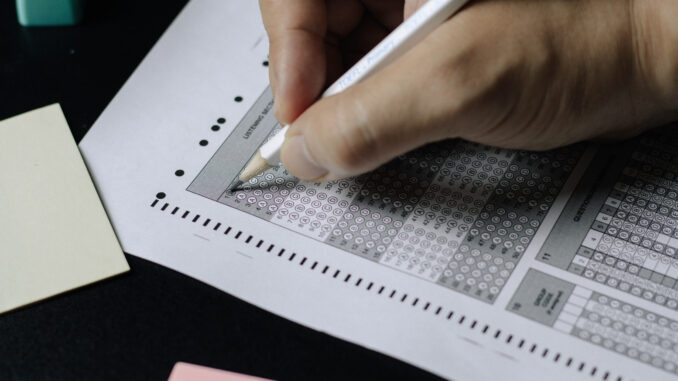
by Mia Lubrani| staff columnist
Feb. 10, 2022
By 2024, the College Board will be administering the Scholastic Aptitude Test (SAT) completely online, as an attempt to modernize the SAT and ensure the safety of test-takers. The new process may have come too late for high school students due to recent claims that the test has become irrelevant to college admission.
The SAT is an outdated testing system, only evaluating students in English and math. Moreover, many colleges now don’t require an SAT, and students shouldn’t have to stress over a test that doesn’t matter, let alone in a pressure cooker classroom setting. The online aspect has come too late, and many students already enrolled in college deserved the option when it mattered.
An increasing number of colleges are opting out of the SAT. For the 2022 fall enrollment process, that number will be at least 1,785 test optional universities, according to Fair Test. That is a near 80% of universities that will be ditching the decades-old standard of SAT/ACT requirement.
Most institutions will still accept scores. When applying to Duquesne University last year, I submitted my SAT score to the McAnulty College of Liberal Arts, and chose to submit my scores although the university extended the optional policy because I had already taken my test. Many of my friends applied to colleges like Penn State University, Duquesne and The University of Pittsburgh without submitting scores and were also accepted.
Some argue that tests will still play a role in the administration process, and the College Board published an argument for the continuation of the testing. According to the College Board, 83% of students say they want the option to submit scores in college applications.
Normal test procedures will still be taken for students when the test becomes virtual. Proctored settings, like schools or testing centers, are still a requirement when scheduling to take the exam. It will still be scored on a 1600 scale. Also, there will still be multiple-choice sections.
There are many nontraditional aspects of the new test. Students everywhere are content that the exam will run about two hours long, cutting an hour off the time and adding more time per question. The College Board also eliminated the SAT’s optional essay and subject tests. USA Today explains the digital test will operate under adaptive testing, changing the test wording and questions in goals of reducing the time students spend answering questions that are too easy or too hard.
Touching upon the inequities in access to technology, the College Board is allowing students to use their device, a school issued device or a College Board issued device. Students can use a laptop or tablet. The digital SAT has also been revamped to ensure work is saved in the case of a loss of connectivity. This new process ensures that cheating is practically impossible because of the unique test form for each student.
I personally had to take AP tests online. The tests from home made the test less stressful, and I saw no difference in the ability to take a test online besides being able to constantly keep pace with the digital timer. Having the chance to do the SAT online would’ve been more convenient, because waiting for the scores to drop was always the most worrisome part.
More updates include reading sections that are shorter with one question related to each, the allowance of calculators during the entire math section and scores received within days rather than the multiple week prolongation.
In the fall pilot of the test, administered virtually through the College Board, 80% of students found the virtual format to be less stressful and 100% of educators reported a positive experience.
NBC News said that the recent ditching of test requirements may be due to criticism that the exams favor wealthy white students and put minority and low-income students at a disadvantage. The unfair nature of extreme test prep and distrust because of the 2020 admission scandal have caused backlash and cancellation of the test.
The College Board argues that their test helps to connect low-income students to colleges or scholarships that might otherwise pass them over. The new digital format is meant to increase safety and access to the test while Covid-19 is a continued barrier in education. Khan Academy’s online study programs and College Board’s practice tests, free to all, will prepare students for their digital format.
Although the College Board is actively making changes to update the test in accordance with safety and equality, the test-takers and universities have seemed to cancel the decades-long standard of SAT/ACT requirements for the time being.
Students’ abilities and intelligence are measured on more than a basis of getting above 1000 points on an SAT in the subjects of Math and English. Students have specialities in theater, arts, argument, math, english, sciences and languages. The entire education system could be improved because it is the most stagnant institution in American society, with the model originating in 1837 according to Wonderopolis.
With the test becoming more irrelevant to colleges’ admissions due to Covid related shutdowns, the number was significantly down from 2.2 million to 1.5 million test-takers. The College Board may be making these changes to boost their popularity and accessibility back to their normal consumer level.


